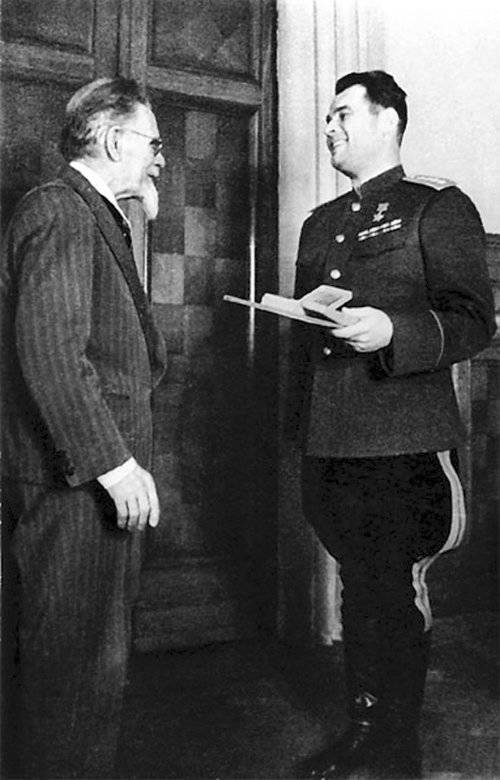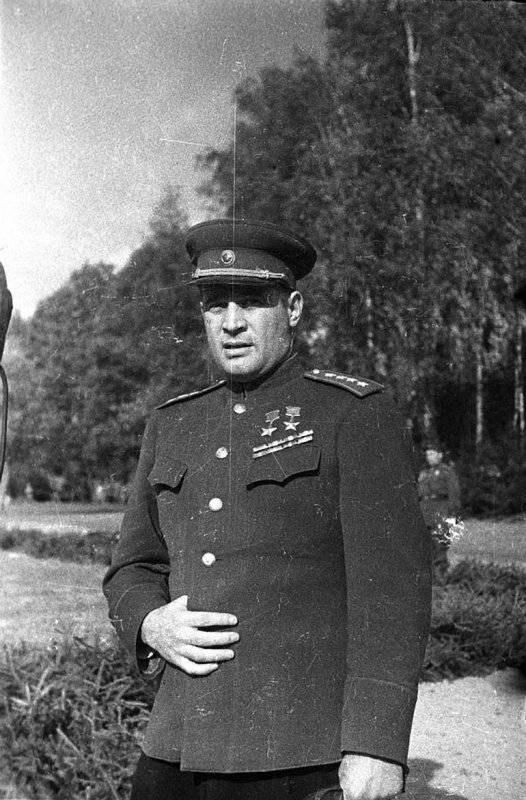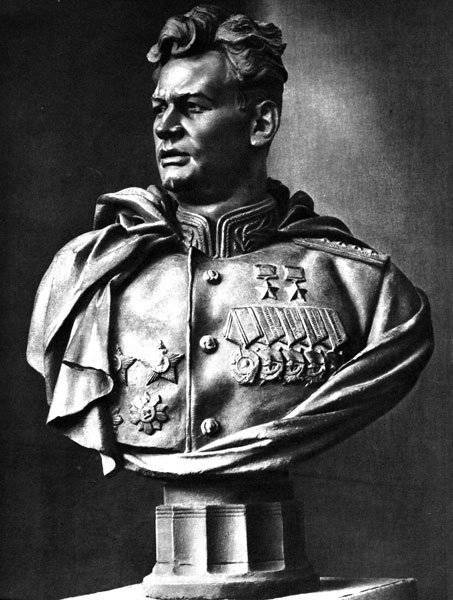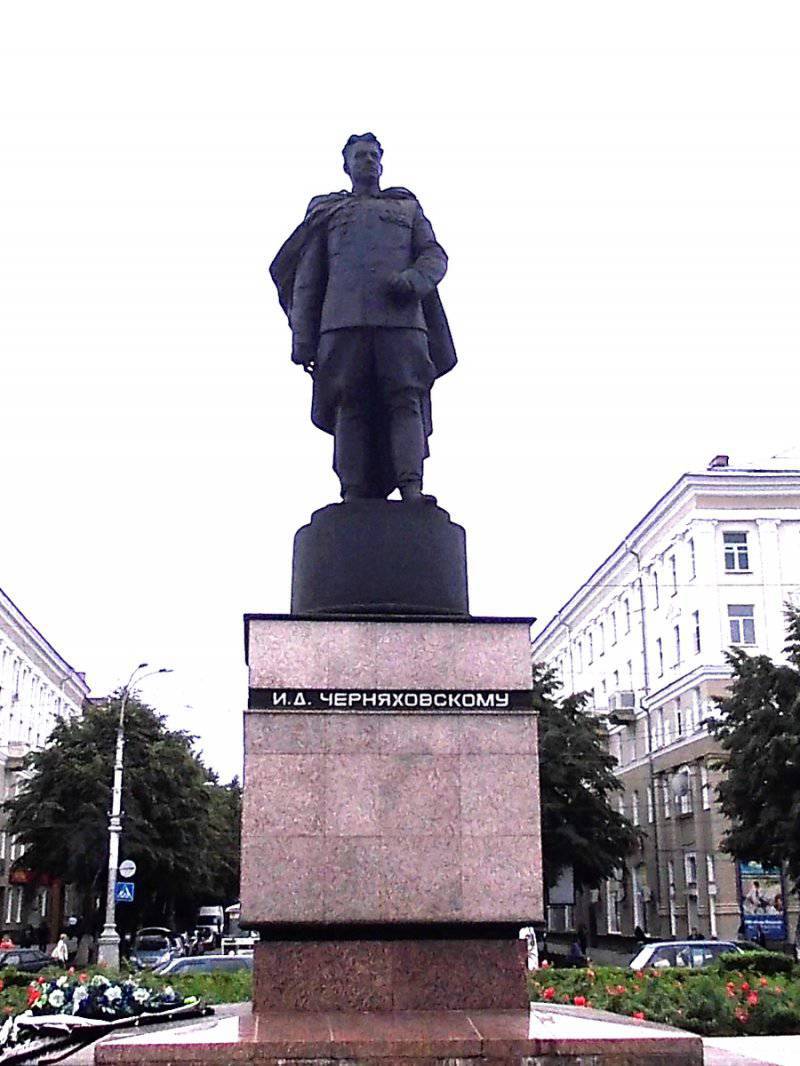One of the most talented commanders of the Great Patriotic War - Ivan Danilovich Chernyakhovsky
The message of the Central Committee of the CPSU (b), the CPC of the USSR and the People's Commissariat of Defense.
Ivan Danilovich Chernyakhovsky (16 (29) June 1906 - February 18 1945) was one of the most talented young generals who advanced during the Great Patriotic War. Twice Hero of the Soviet Union (1943, 1944). Chernyakhovsky became the youngest army general in the Red Army (in 37 years) and the youngest front commander in stories Soviet Armed Forces. He was called "Soviet Suvorov", he was loved by the soldiers and the enemies were afraid. And the secret of his death is still shrouded in darkness.
Ivan was born in the village of Oxanino, Umansky district, Kiev province. According to some data, he was born in 1906 year, according to others - in 1907, he added one year to be hired (at a young age), besides, one year was not enough for admission to the Komsomol organization. His parents were the landless batrac, Danila Nikolayevich and Maria Lyudvigovna. He was the fourth child, and there were six children in the family. His father worked as a groom at the local lord, and then got a job as a worker at the Vapnyarka railway station. In 1913, Ivan entered the Vapnyarsk Primary Railway School, where he studied before the 1919 year.
Ivan's life began hard. The family was poor and needed. Especially when World War I began and my father was mobilized, sent to the front. In 1915, he was injured, returned home. During the civil war, parents died of typhus. Ivan started to work early. Ivan's first teacher recalled: “After the death of her parents, Vanya was forced to leave school and become a shepherd. Happened, he will expel the flock in the field, and he himself takes up the books. Barely having supped, he immediately comes to me for an explanation of the new material. ” Chernyakhovsky was a rural shepherd, was homeless for a while, then became a laborer and apprentice. Worked tirelessly, stubbornly sought knowledge. Already in his youth, people who knew the young man well, his peers, comrades in work and studies noted in him exceptional diligence, perseverance, a sense of duty and indomitable willpower, striving to achieve the goal. Ivan was always collected, honest and disciplined.
In May, 1920, Ivan, with the help of Tseshkovsky's relatives (he was a friend of his father and sheltered three children) got a job as a railway worker. Worked as an assistant locksmith. Interested in political life. Under the influence of Ivan Tseshkovsky, who was the chairman of a rural Komsomol cell, he constantly attended meetings and gatherings, participated in discussions on various political issues. In the spring, 1922 externally passed the exams for a junior high school, was elected secretary of the Verbovsky Komsomol cell. Ivan was full of energy, on his initiative and active participation in the village would have built a club, where they began to hold cultural evenings. In addition, they founded a choir and a drama group, in which Chernyakhovsky showed his acting talent. Then they opened the village library.
At the same time, Ivan Danilovich early on felt his military vocation. The purpose of his life was military service. His Komsomol cell was a division of the Tulchinsky battalion of special purpose units (CHON). The Verbovsky "platoon" of the Vapnyarsky company of the CHON, commanded by Chernyakhovsky, received several rifles and revolvers, grenades and a box of ammunition. Even then, Chernyakhovsky took part in the defeat of the Maruski gangs in the Krizopol forests and the Green in Tomashpolsky. In 1923, a platoon of Chernyakhovsky eliminated the Knisha gang in the Krizhopol area. For the skillful organization of the detachment’s actions and personal courage, Ivan Chernyakhovsky was noted for his personal fighting. weapons - Mauser. This was his first award.
Ivan moved to Novorossiysk for further study and work. From May 1923 to September 1924, he works at the Novorossiysk 1 State Proletary Cement Plant. The guy immediately showed himself and was elected to the secretaries of the first shop and then the factory Komsomol bureau. Simultaneously, Chernyakhovsky finished driving courses and began working as a chauffeur. He devoted his free time to developing the qualities necessary for a soldier: he went in for sports and in the rifle circle, studied technique.
In September, 1924, the Novorossiysk Komsomol District Committee, sent Ivan to the Odessa Infantry School. Ivan studied perfectly well. Became the winner in a number of disciplines, including shooting. He was even awarded a prize for excellent results in various types of combat training. In the company where he studied, he was elected leader of the Komsomol. Therefore, when Chernyakhovsky submitted a report on the transfer to the Kiev artillery school, the capable and hard-working cadet did not even want to let go. However, Chernyakhovsky showed his characteristic perseverance in achieving the goal, moreover, during this period special attention was paid to the development of artillery, sending the most talented young people to it.
In 1925, Chernyakhovsky was transferred to an art school, which he successfully graduated from in 1928. In 1928, he joined the VKP (b). Ivan showed himself well and was one of the foremost cadets in Kiev. Quickly eliminated the backlog in the disciplines for the first year of study, perfectly passed the exams. During his studies he became the captain of the football team, showed good results in shooting, equestrian and athletics. He also actively participated in amateur performances, became a battery chant.
After graduation, Chernyakhovsky served as commander of a training platoon, with a political commissar from 1929, and then battery commander of the 17 corps artillery regiment in the Ukrainian military district, which was stationed in Vinnitsa. In the period from 1929 to 1930, the year was also temporarily performing the post of head of communications of the 17 corps artillery regiment, head of the topographic detachment. In 1930, he graduated from high school in the evening. From July 1930 to May 1931, he was the commander of the reconnaissance training battery of the 17 corps artillery regiment.
During the service, Chernyakhovsky was preparing for admission to the Leningrad Military-Technical Academy of the RKKA. F.E. Dzerzhinsky. She became her listener in 1931 year. After its transformation into 1932, he was a student in the command department of the Military Academy of Mechanization and Motorization of the Red Army named after I. V. Stalin (it was established on the basis of the Faculty of Mechanization and Motorization of the Military Technical Academy). In 1936 he graduated from the Academy with honors and the rank of lieutenant. During his studies he passed a military internship as a battalion commander, deputy chief of staff of the division.
While studying with Chernyakhovsky, an unpleasant story happened. It was surrounded not only by comrades, but also by envious people. In 1937, Ivan Danilovich was denounced that he "hid his social origin." Allegedly his father served in the White Army. This threatened to exclude from the academy and the party. However, Chernyakhovsky demanded a hearing. In addition, he was supported by his sister V.I. Lenina - Maria Ulyanova, who worked as the head of the Joint Complaints Bureau of the People's Commissariat of the RCT of the USSR and the People's Commissariat of the RCTs of the RSFSR. A thorough investigation showed that the denunciation was wrong.

M.I. Kalinin presents the award I.D. Chernyakhovsky
After graduating from the Academy, Chernyakhovsky received the post of chief of staff of the 2nd separate tank battalion of the 8th mechanized brigade of the Kiev military district. Soon, at the suggestion of the brigade commander, he was awarded the rank of captain. And in 1937 he became commander of the 1st tank battalion of the 8th mechanized brigade of the Belarusian Special Military District. Since 1938 - Major, commander of the 9th separate light tank regiment of the Belarusian Special Military District. He was noted as an extremely conscientious, well-versed in military affairs and enjoying authority commander. In 1939, when the Chernyakhovsky regiment took first place during the audit, he received the rank of lieutenant colonel ahead of schedule. Immediately before the war, he served as deputy commander of the 2nd tank divisions of the Baltic Special Military District.
In March, 1941, the 35-year-old officer became the commander of the 28-th tank division of the 12-th mechanized corps of the Baltic Special Military District. The division was stationed in Riga and was armed with more than 200 light tanks BT-7, several dozen light tanks T-26, armored vehicles BA-10 and BA-20. Commanding the 28 Panzer Division, Colonel Chernyakhovsky joined the battles of World War II. Tankers of Chernyakhovsky fought in battles south-west of Siauliai, on the Western Dvina, under the Soltsy, defended Novgorod. According to eyewitnesses, Ivan Danilovich proved to be a brave commander, he personally went on the attack, knocked out an enemy tank.
On June 23, the division fought with the German 1st Panzer Division. Before the battalion of manpower, 14 tanks and 20 enemy guns were destroyed. On June 25, the 28th Panzer Division destroyed the convoy of the 8th motorized regiment of the enemy, captured and destroyed a significant number of guns. However, Chernyakhovsky’s division suffered heavy losses in the first brutal battles. Moreover, a significant part of the armored vehicles died from enemy attacks aviation. By July 12, the division was bloodless and aimed at restoration. It was replenished somewhat, and on August 14 Chernyakhovsky’s division took up defense in the Novgorod region. In fierce battles in the Novgorod region, the 28th Panzer Division fought for literally every piece of land and suffered heavy losses. The division lost up to 2/3 of the personnel. At the end of August 1941, the 28th division was transferred to the area of Demyansk, where it was surrounded. When the remnants of the division made their way out of the encirclement, about a battalion remained in it (552 men and 4 guns). After the replenishment in November, the division fought defensive battles at the turn of the Valdai and Valdai Heights.
Then the division was taken to the rear for re-formation. In December, 1941 was reformed into the 241 Rifle Division. Chernyakhovsky himself was seriously ill and was sent to hospital. In January 1942, by decree of the Presidium of the Supreme Soviet of the USSR, Ivan Chernyakhovsky was awarded the Order of the Red Banner for clearly organizing the defense of Novgorod, personal participation in fighting, courage and courage, educating young commanders.
In winter - in the spring of 1942. The 241 Infantry Division under the command of Chernyakhovsky distinguished itself in the Demyansk offensive operation of the troops of the North-Western Front. For these battles, Chernyakhovsky was awarded the second Order of the Red Banner and received the rank of Major General.
In June, 1942 of the year was at the disposal of the Chief of the Main Automobile and Armored Administration. Then for some time he commanded the 18 tank corps of the Voronezh Front. During the stubborn fighting with the enemy was contused. Since July 1942 of the year, at the suggestion of the General NF, which had just headed the Voronezh Front. Vatutin, who noted the actions of a young, stubborn and well-trained commander, Chernyakhovsky became the commander of the 60 army. He commanded this army until April 1944.
60-I army distinguished themselves in the Voronezh-Kastornoye operation. In February, the Chernyakhovsky town of 1943 for the capture of Voronezh was awarded the Order of the Red Banner for the third time. In addition, in February, the Chernyakhovsky army for five days of continuous battles passed 90 km, liberated 350 from Soviet villages and villages, took part in the liberation of Kursk. For this success, the general was awarded the Order of Suvorov of the 1 degree and was given the rank of lieutenant general.
It must be said that many people noted the high human qualities of Chernyakhovsky. B. I. Vinogradov, the driver of Chernyakhovsky, noted that the remarkable qualities of a strong-willed commander attracted people to him. Marshal K.K. Rokossovsky: “It was a wonderful commander. Young, cultural, cheerful. Amazing man! It was obvious that the army loved him very much. ” Ivan Danilovich was demanding of himself and those around him. He was always smart, loved strict discipline. With all his appearance he inspired confidence, they saw in him a real commander.
The sixtieth army proved to be excellent and in the course of subsequent operations. As part of the Central Front, the Chernyakhovsky army took part in the crucial Battle of Kursk and the liberation of Left-Bank Ukraine. During the offensive in August-September 1943, the 60-I army liberated the Glukhov, Konotop, Bakhmach and Nezhin. Soviet soldiers forced the Desna and the Dnieper. In September 1943, Ivan Danilovich was awarded the second order of the 1 degree. October 17 1943 of the year for forcing the Dnieper to seize important bridgeheads and personal heroism shown Chernyakhovsky was awarded the title Hero of the Soviet Union. 306 soldiers of the 60 Army were presented to the rank of Hero of the Soviet Union.
In October, the 1943 60 Army was handed over to the Voronezh Front, from November 1943 to April 1944 was part of the 1 Ukrainian Front. During this period, the Chernyakhovsky army took part in the Kiev offensive, Kiev defense, Zhytomyr-Berdichev, Rivne-Lutsk and Proskurov-Chernivtsi operations. In the course of these operations, the 60 Army liberated hundreds of settlements. 5 March 1944 of the year Chernyakhovsky was promoted to the rank of colonel general.
On April 15, Colonel General Chernyakhovsky headed the Western Front (from April 24 - transformed into the 3 Belorussian Front). He became the youngest Soviet front commander. Under his command, the 3 Belorussian Front took part in the Belorussian (Operation Bagration), Vilnius, Kaunas, Memel, Gumbinnen-Goldap and East Prussian offensive operations.

Army General Ivan Danilovich Chernyakhovsky, Commander of the Belarusian Front 3, 1944 Year
The troops under the command of Chernyakhovsky took part in the liberation of Vitebsk and Minsk. In July, Vilnius and Lida were released. Moreover, Chernyakhovsky saved Vilnius from great destruction, ordering not to use air strikes and not to use heavy weapons. 28 June 1944, Chernyakhovsky became the youngest army general in the Red Army (in 37 years). In July, Chernyakhovsky became the twice Hero of the Soviet Union.
18 February 1945 of the year near the town of Melzak in East Prussia (now it is the territory of Poland) Ivan Danilovich Chernyakhovsky was mortally wounded by a fragment of an “accidental” projectile. He died the same day. General Alexander Gorbatov witnessed the death of a young commander. I must say that there is a version according to which the projectile was Soviet.
Chernyakhovsky was buried on February 20 in Vilnius on the central square of Ozheshkenes. In recognition of the merits of Ivan Danilovich in the liberation of Lithuania from the Nazis in Vilnius, he erected a monument. In East Prussia, which became the Soviet Kaliningrad region, the city of Insterburg was renamed Chernyakhovsk. There is evidence that Chernyakhovsky was going to be presented for the rank of Marshal of the Soviet Union, but he died before the promulgation of the decree.
In 1992, the ashes of a Soviet general, at the request of the Lithuanian authorities, were transported from Vilnius to Moscow and reburied at the Novodevichy cemetery. A monument to the work of the national artist of the USSR sculptor N. V. Tomsky from Vilnius was transported to Voronezh, which at the end of 1942 defended and at the beginning of 1943 liberated the 60 army under the command of I. D. Chernyakhovsky. The monument to Chernyakhovsky is also installed in Odessa, and the bust is in Uman. In addition, the streets in Novgorod, Voronezh, Vitebsk, Zhytomyr, Kiev, Moscow and many other cities were named after the hero. A museum was opened at the hero's homeland, a bust and a memorial sign were installed. Russia remembers its hero.
Monument to General Ivan Danilovich Chernyakhovsky in Voronezh on Chernyakhovsky Square
Application. Memories of contemporaries
Marshal A. M. Vasilevsky on I. D. Chernyakhovsky: “Good knowledge of the troops, diverse and complex equipment, skillful use of the experience of others, deep theoretical knowledge allowed him to perfectly manage the troops, to solve complex tasks ... He listened keenly to the opinion of his subordinates. He boldly used everything new and useful in training troops and organizing combat ... He was strict and demanding, but he never allowed himself to degrade human dignity. ”
“I experienced the loss of Ivan Danilovich very hard. I knew him well and appreciated him a great commander, the boundless honesty of a communist, an exceptional human soul. ”
Marshal I. Kh. Baghramyan: “A broad military outlook, a high general and professional culture, an unusual working capacity and a wealth of experience in training and guiding troops allowed him to quickly assess the situation, correctly determine the main thing necessary for making rational decisions. He often appeared where the situation was the most difficult. With his presence alone, Chernyakhovsky instilled courage and faith in success into the hearts of warriors, skillfully directed their enthusiasm to defeat the enemy. ”
Colonel-General A.P. Pokrovsky, former chief of staff of the 3 of the Byelorussian Front: "Chernyakhovsky, on the other hand, demanded that the task be brought to the soldier on such a scale that he, following the Suvorov rule," understood his maneuver. " The ideas formulated in the decisions of the commander captured all the warriors, found their recognition and support. I often heard from the lips of soldiers and commanders: “With such a commander, it’s not scary to go on fire and into water.” From the new commander, we, the staff of the front headquarters, expected reproaches for failures in recent offensive operations. However, to everyone's satisfaction, no one had to hear them. Ivan Danilovich was very polite, restrained, sociable, he understood well when it was necessary to use the word “I” and never abused it. He was a man of great tact, perfectly controlled himself, never resorted to degrading warrior races. With his arrival, a calm, businesslike atmosphere was established at the headquarters. ”
A. V. Gorbatov, commander of the 3 Army of the 3 of the Belorussian Front: “There is evidence that I.D. Chernyakhovsky was presented to the rank of Marshal of the Soviet Union, but died before the promulgation of the Decree. On the death of the commander were notified troops. We called mercilessly to avenge the enemy for our great loss. It was a real loss for the Red Army - Chernyakhovsky was young, talented and could give a lot more to our Armed Forces. ”
Captain L. S. Tserlevskaya: “General Chernyakhovsky was demanding both to the soldiers and to himself. In battle, he loved strict discipline. He was always smart. Even in his external image, discipline was visible, and in his eyes one could feel the great will power of the commander and the deep mind of a person. With his own appearance, General Chernyakhovsky is a beautiful Russian bogatyr, in whom not only physical strength was felt, but also a large will power of the commander. ”
From the memoirs of the second child of Ivan Danilovich Chernyakhovsky - Oleg: “Our father loved music very much. We often moved, but we always took our guitar with us. He played it well and sang a beautiful baritone. Preferred Ukrainian songs. In the upbringing was strict. We had to study well not to let him down. He told us all the time about it. He even wrote from the front: “Join the ranks of the best students. This is your father's position. ” He was convinced that everyone should fulfill his duty, and our duty was to study well. By the way, my sister and I finished school with gold medals. ”


Information